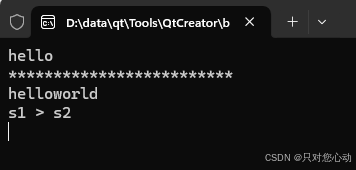实现了String类的大部分封装,采用分文件编译
cpp
//mystring.h
#ifndef MYSTRING_H
#define MYSTRING_H
#include <iostream>
#include <cstring>
using namespace std;
class myString
{
private:
char *str; //定义一个字符串
int size; //记录字符串长度
public:
//成员函数:
//1.构造函数
myString(const char* s);
//2.析构函数
~myString();
//3.为字符串赋值函数 "="
myString & operator=(const myString &other);
//4.访问指定字符,有边界检查 "at"
char &s_at(int index);
//5.访问指定字符 "operator[]"
char &s_operator(int index);
//6.返回指向字符串首字符的指针 "data"
char *s_data();
//7.返回字符串的不可修改的C字符数组版本 "c_str"
const char* s_c_str()const;
//8.检查字符串是否为空 "empty"
bool empty();
//9.返回字符串长度 "size"
int s_size();
//10.返回字符串长度 "length"
int s_lenth();
//11.返回当前对象分配的存储空间能保存的字符数量 "capacity"
int s_capacity();
//12.清除内容 "clear"
void s_clear();
//13.后附字符到结尾 "push_back"
void s_push_back(char c);
//14.移除末尾字符 "pop_back"
void s_pop_back();
//15.后附字符到结尾 "append"
void s_append(const char *s);
//16.后附字符到结尾
myString &operator+=(const myString &other);
//17.连接两个字符串或者一个字符串和一个字符
const myString operator+(const myString &other)const;
//18.比较字符串
bool operator==(const myString &other) const;
bool operator!=(const myString &other) const;
bool operator<(const myString &other) const;
bool operator>(const myString &other) const;
bool operator<=(const myString &other) const;
bool operator>=(const myString &other) const;
//19.输入输出
friend ostream &operator<<(ostream &os, const myString &s);
friend istream &operator>>(istream &is, myString &s);
};
#endif // MYSTRING_H
cpp
//mystring.cpp
#include "mystring.h"
myString::myString(const char* s)
{
size = strlen(s); //求传入的字符串长度
str = new char[size+1]; //申请空间存储字符串
strcpy(str,s); //将字符串拷贝到str中
}
myString::~myString()
{
delete[] str;
}
myString &myString::operator=(const myString &other)
{
if(this != &other)
{
delete[] str;
size = other.size;
str = new char[size + 1];
strcpy(str, other.str);
}
return *this;
}
char &myString::s_at(int index)
{
if(index < 0 || index >= size)
{
cout<<"输入错误"<<endl;
}
return str[index];
}
char &myString::s_operator(int index)
{
return str[index];
}
char *myString::s_data()
{
return str;
}
const char *myString::s_c_str() const
{
return str;
}
bool myString::empty()
{
return size == 0;
}
int myString::s_size()
{
return size;
}
int myString::s_lenth()
{
return size;
}
int myString::s_capacity()
{
return size+1; //有一个'\0'
}
void myString::s_clear()
{
delete[] str;
str = NULL;
size = 0;
}
void myString::s_push_back(char c)
{
delete[] str;
str = new char[size+1];
str[size-1] = c;
str[size] = '\0';
}
void myString::s_pop_back()
{
if(size > 0)
{
size--;
str[size] = '\0';
}
}
void myString::s_append(const char *s)
{
int new_size = size + strlen(s);
char* temp = str;
str = new char[new_size + 1]; // 分配新内存
strcpy(str, temp); // 复制旧字符串
strcat(str, s); // 追加新字符串
delete[] temp; // 释放旧内存
size = new_size;
}
myString &myString::operator+=(const myString &other)
{
s_append(other.str);
return *this;
}
const myString myString::operator+(const myString &other) const
{
myString temp(*this);
temp.s_append(other.str);
return temp;
}
bool myString::operator==(const myString &other) const {
return strcmp(str, other.str) == 0;
}
bool myString::operator!=(const myString &other) const {
return strcmp(str, other.str) != 0;
}
bool myString::operator<(const myString &other) const {
return strcmp(str, other.str) < 0;
}
bool myString::operator>(const myString &other) const {
return strcmp(str, other.str) > 0;
}
bool myString::operator<=(const myString &other) const {
return strcmp(str, other.str) <= 0;
}
bool myString::operator>=(const myString &other) const {
return strcmp(str, other.str) >= 0;
}
istream &operator>>(istream &is, myString &s)
{
char buffer[1024]; // 假设输入的字符串不超过1024个字符
is >> buffer; // 从输入流中读取字符串
s = buffer; // 将读取的字符串赋值给 myString 对象
return is; // 返回输入流的引用
}
ostream &operator<<(ostream &os, const myString &s)
{
os<<s.s_c_str();
return os;
}
cpp
//main.cpp
#include "mystring.h"
int main()
{
myString s1("hello");
cout<<s1<<endl;
cout<<"*************************"<<endl;
myString s2("world");
cout<<s1+s2<<endl;
if(s1>s2 == 1)
{
cout<<"s1 > s2"<<endl;
}
else
{
cout<<"s1 < s2"<<endl;
}
return 0;
}输出结果如下:
